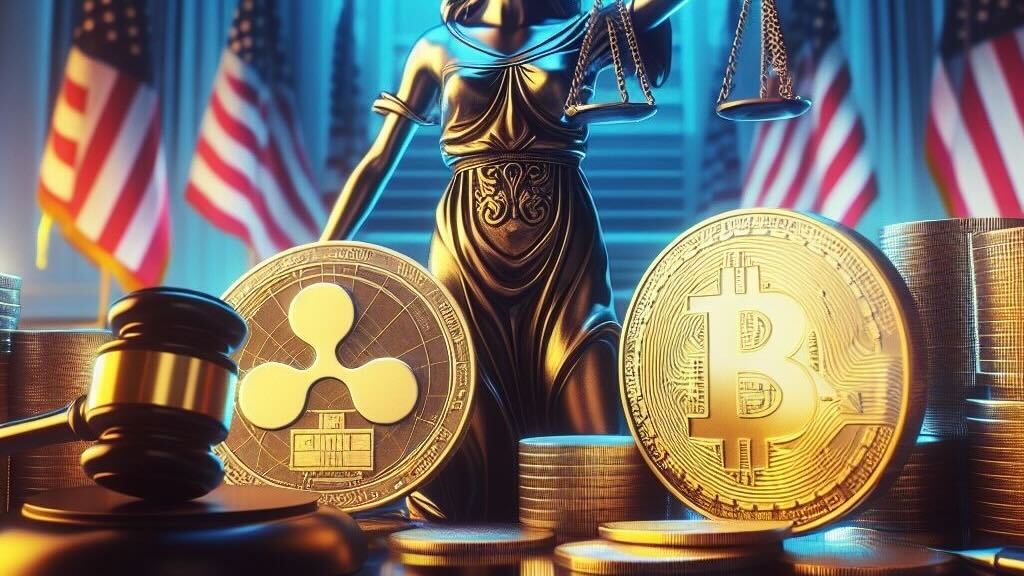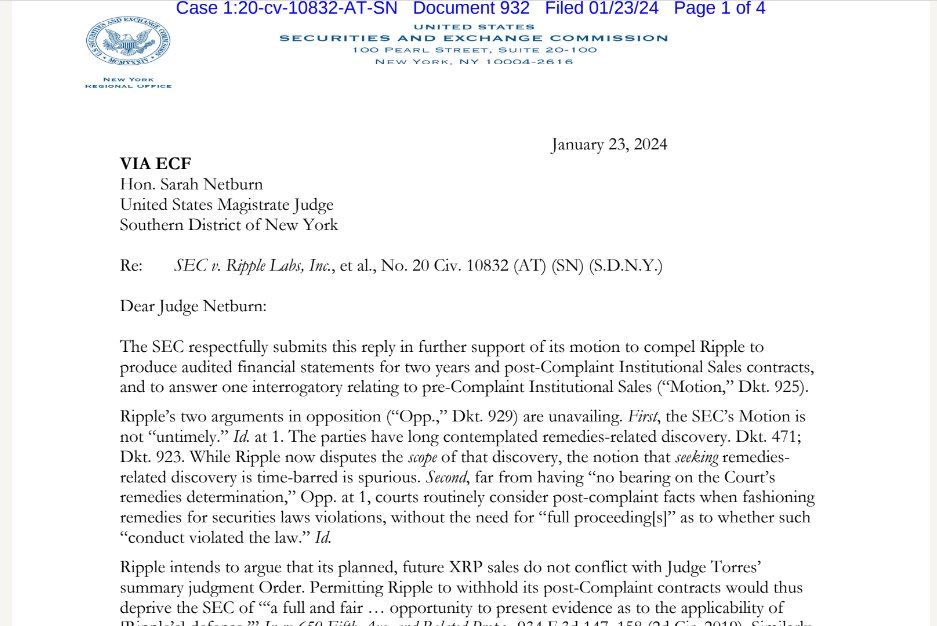The Securities and Exchange Commission remarks on Ripple's pushback against its enforcement motion, insisting that financial evidence is essential.
In Brief
In its reply, the SEC argues that their requests for evidence align with standard protocol and are aimed at enforcing penalties.

The United States Securities and Exchange Commission has provided a response to the technology firm’s disagreements over the need for audited financial records spanning two years as well as details surrounding post-complaint contracts related to XRP transactions. SEC In a recent court submission on January 23, the SEC further justifies its motion to compel evidence, arguing that its request for discovery concerning remedies is timely and follows appropriate procedures while highlighting that in cases of securities law infringements, courts often assess post-complaint facts in relation to remedial actions. Ripple’s (XRP) The SEC is actively seeking penalties against Ripple, intending to deliver a firm warning regarding the seriousness of securities law violations.
It's important to note that the SEC is not pursuing a mini-trial or seeking a verdict on the legality of post-complaint institutional sales, including those made to on-demand liquidity (ODL) clients, since such decisions are unnecessary to issue an injunction that could halt ongoing sales.
There is a potential for the US SEC to secure a victory against Ripple concerning its discovery requests relating to XRP sales. Ripple Ripple has a chance to argue that it intends to revise future ODL sales to fall outside the parameters of what is deemed institutional sales for judgment purposes.
Conversely, the SEC argues that obtaining access to contracts made post-sale and after the summary judgment is critical for evaluating Ripple’s intentions and understanding the commercial feasibility of compliant ODL sales.

The SEC has submitted a declaration from Carolyn Dicharry.
Ripple contends that the SEC failed to initiate the discovery phase while it was still available and has no valid rationale for seeking further discovery related to sales that occurred after the complaint. Additionally, they allege that the SEC has already utilized all allowable interrogatories in the current case.
In response, the SEC introduced a statement by Carolyn Dicharry, who provided consulting services to Ripple from 2015 to 2019. In her testimony, she confirmed that Ripple, through XRP II LLC, entered into direct sales agreements for XRP with 23 distinct counterparties, drawing on Ripple's business records from July 2017 to April 2020.
The inclusion of Dicharry's declaration injects a factual layer into the current legal battle, offering concrete insights into Ripple’s historical contracts for XRP sales.
She further elaborated that the bulk of XRP transactions from May 2020 through June 2023 constituted ODL transactions, with XRP being sourced directly from Ripple. In addition, she noted that Ripple engaged in some sales on centralized cryptocurrency exchanges via market-makers, although the buyers involved remain unidentified.
Last year, the federal district judge sent the case involving the SEC and Ripple to trial, opting not to grant a summary judgment regarding whether XRP should be classified as an unregistered security.
Judge Analisa Torres determined that XRP is not a security when traded on the secondary market. However, she ruled it would qualify as a security if sold as part of an investment contract to institutional purchasers.
Torres reached this conclusion after analyzing Ripple’s automated 'programmatic' sales, asserting that they did not represent securities offerings because the purchasers were not investing in Ripple itself.
SEC vs. Ripple Lawsuit Goes to Trial
In October, Ripple celebrated the dismissal of all allegations against its executives in the ongoing lawsuit, allowing the company to focus on its broader goals. ongoing lawsuit The SEC's latest response to Ripple's counterarguments signals a pivotal moment in this drawn-out legal confrontation, unveiling new aspects of the case.
Securities and Exchange Commission: please keep in mind that the details shared on this page are not meant to serve, nor should they be interpreted as legal, tax, investment, financial, or any other form of advice. Only invest what you can afford to lose, and seek independent financial counsel if you have uncertainties. For more comprehensive details, we recommend reviewing the terms and conditions along with help resources provided by the issuer or advertiser. MetaversePost remains dedicated to precise, impartial reporting; however, market conditions can change without prior notice.
Alisa, an enthusiastic journalist at Cryptocurrencylistings, focuses on cryptocurrency, zero-knowledge proofs, investments, and the expansive scope of Web3. With her sharp insight into emerging trends and technologies, she offers in-depth coverage to engage and inform readers in the constantly evolving domain of digital finance.
Blum marks its one-year milestone with accolades for 'Best GameFi App' and 'Best Trading App' at the Blockchain Forum 2025. expansion efforts in Europe and Africa.
Addressing DeFi fragmentation: exploring how Omniston enhances liquidity on the TON ecosystem.
Disclaimer
In line with the Trust Project guidelines Solv Protocol, Fragmetric, and Zeus Network have joined forces to launch FragBTC, a groundbreaking yield-generating Bitcoin product native to Solana.







